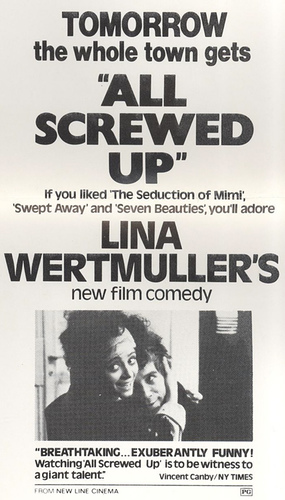
ALL SCREWED UP (EVERYTHING IN ORDER BUT NOTHING IN PLACE)
Italy, 1974, 104 minutes, Colour.
Luigi Diberti, Lina Polito.
Directed by Lina Wertmuller.
All Screwed Up (Everything In Order But Nothing In Place) is an early film by celebrated director-writer Lina Wertmuller. She achieved a considerable reputation in Italy with her left wing social comment dramas. They had the echo of documentary but also the intensity of the political and social situation in Italy dramatised for the popular audience. She was also taken up by intellectuals. Some of her films were then released overseas and she had a cult following in the United States. This reputation then extended throughout the world and she received an Oscar nomination as Best Director for Seven Beauties. Warner Bros. made a contract with her for several films but only one, not a box office success, was made: A Nightful of Rain, with her regular lead Giancarlo Giannini and Candice Bergen. Other Wertmuller films of note are: The Seduction of Mimi, Love and Anarchy, Swept Away, Blood Feud. This film doesn't have her regular stars but shows the themes of people from the South trying to adapt to the North, the work and social situation of the North and the devastating effects it can have on people trying to adapt.
1. The work of Lina Wertmuller? At the time the film was made, social concern? Social and political point of view? This film seen in the retrospect of her later films?
2. The irony of the title? The anarchist point of view? The film and the characters as an allegory of Italy in the '70s?
3. The world of Milan, Milan as a city, its history, its present? The more prosperous North? The buildings, factories? Lina Wertmuller's cinema styles, semidocumentary? The editing and pace? The score?
4. The realism of the '70s and the style of images presented? The picturing of the main characters and their trying to cope? The socialist background of Italy, communist, fascist? The memories of the war, of Mussolini, of the post-war decades? The confusion of politics? The difficulties of labour and unemployment? Social oppression? Demonstrations? Italian values and their crises and testing? Moral traditions and the more permissive 170s? The clash and confrontation of traditions and religion?
5. The contrast between North and South? The relative poverty and wealth? Lack of opportunity? The ignorance in the South? The long-standing traditions and their hold? Sending back of money to the South? The hopes in the North? The changes that the North would make on Southern people?
6. The focus on Carletto and Gigi on their arrival? The meeting with Adolina, Isatta? The encounter with the bike thief and all that this would lead to?
7. The search for work? The picture of work? The meat and the operatic tone in showing the mat works? The fruit, the market, the restaurant? The cross-section of Italian occupations as part of the allegory of Italy?
8. Living quarters, apartments, buildings? The glass buildings versus the old apartments? The need for co-op living together, the view from the house, the stories of people? Biki being in charge? The role of the woman, the men, the various arrangements and living together? Money? Washing, TV? Sexual relationships and privacy? Babies and children? Sante and Mariuccia?
9. Carletto as a hero: nice, his work, winking? Adolina and her hold? Her strong traditional approach? Resistance? The virtual rape? The repercussions on both? The arrangement? The changing of all points of view because of the change in the sexual relationship? The work the helping of Sante?
10. Gigi and the thief, the clothes, sexual relationship, Isotta? Her not being willing to help? The changes that prosperity made?
11. Adolina and the changes in her? Money, ignorance, her appearance?
12. Biki and the exercise of control?
13. Isotta as prostitute and then her disappearance?
14. Sante and his watching, the skating, the pregnancy?
15. How interesting was this cross-section of young people, their interactions, friendships, support, lack of support?
16. A partial picture of a cross-section of Italy in the '70s? How valuable the portrait, how incisive the comment ?